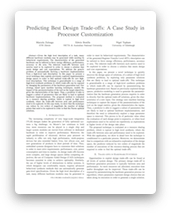Predicting Best Design Trade-offs: A Case Study in Processor Customization
-
Abstract:
Given the high level description of a task, many different hardware modules may be generated while meeting its behavioral requirements. The characteristics of the generated hardware can be tailored to favor energy efficiency, performance, accuracy or die area. The inherent trade-offs between such metrics need to be explored in order to choose a solution that meets design and cost expectations. We address the generic problem of automatically deriving a hardware implementation from a high-level task description. In this paper we present a novel technique that exploits previously explored implementation design spaces in order to find optimal trade-offs for new high-level descriptions. This technique is generalizable to a range of high-level synthesis problems in which trade-offs can be exposed by changing the parameters of the hardware generation tool. Our strategy, based upon machine learning techniques, models the impact of the parameterization of the tool on the target objectives, given the characteristics of the input. Thus, a predictor is able to suggest a subset of parameters that are likely to lead to optimal hardware implementations. The proposed method is evaluated on a resource sharing problem which is typical in high level synthesis, where the trade-offs between area and performance need to be explored. In this case study, we show that the technique can reduce by two orders of magnitude the number of design points that need to be explored in order to find the Pareto optimal solutions.




